Multinational feat
70 years ago, the people of a multi-million country won the Great Patriotic War. Shoulder to shoulder, defending their homeland, Ukrainians and Russians, Georgians and Tatars, Chechens and Jews fought against fascism. Veterans of different nationalities - different stories struggle, but one victory for all. The heroes of our project tell not only about their military experience, but also answer the question: “Is there nationalism on the front?”
The full version of the project can be seen on the website of the online publication "Protect Russia"
Yunus Abdulshaidovich Abdulshaidov
Age 93 year
Chechen nationality
Rank during war sergeant
Awards Order of the Patriotic War, II degree, Order of the Red Star, Order of Zhukov, Medal "For the Defense of Moscow", Medal "For Courage", Medal "For Victory over Germany" and others
Born in 1921 year, his father's name was Abdulshayid, mother - Kiribat. In 18 years married. Leaving for the war, he said: "You are young, I will come, then we will start a family." Broke up with her and went to the Soviet Army.
In June, 1941, we were brought near Rostov, to the city of Shakhtinsk. There, under a simplified program, they taught military affairs. Then they wanted to send to Kiev, but we did not reach it - they said that they had surrendered Kiev. Then he came to Moscow, from there they brought to Borisoglebsk and said: “Take up firing positions”.
We recaptured the Germans from Moscow. And then they sent to Leningrad - to the regimental school to acquire a specialty. I was put a mortar. There were two more comrades with me. Either we do an attack, then we do. Whoever came with me did not survive, all were killed. He received the first order near Leningrad. Shot down a plane, two tank and killed twenty Germans.
Under Bolkhov I was wounded - the shell exploded nearby. I lay for half a year, then back to the front, to Izhevsk. An officer came to recruit a soldier in a military school. We were built, the officer went from the end and asked everyone if there were any awards, partisanship, education, whether we wanted to learn. I went to study at the VMU (Military Medical Administration. - "RR"). It was in 1944.
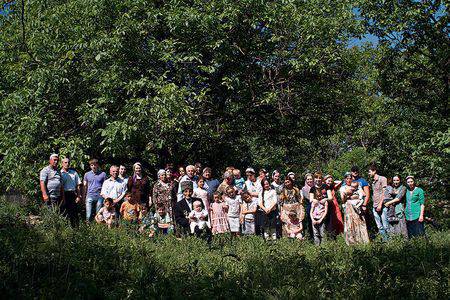
Photo: Varvara Lozenko
Expel
I haven’t received a letter from home for a long time, approached the assistant commander, told me. He says: "Learn, do not lose heart. I find out where your relatives are, why they don’t write. ” A month or two passes, he says nothing. Suddenly a letter arrives from the brother, and the address of the other is the Kirghiz SSR. I came to the class where the cards hung, looked where Kyrgyzstan, where the city of Osh. On the map - one color with the Caucasus, I calmed down a bit. Probably, they were transported to a warm place, I thought, since the color is the same - blue, the weather is warm there. Then the division commander calls me and says: “Your village has been evicted, and the order from Stalin is to expel you from the military school.” The Chechens, the Ingush, the Karachays — all the soldiers from whom the family was evicted were freed. I only received a piece of paper from the doctor - “unfit for service in motorcycle parts, fit for combat service”. I studied for eight months, four months remained to receive a lieutenant rank.
They sent me to relatives. There, my father, brother, sister - all on the collective farm. Very poor farm, impossible to live. I came to the commandant to register — in military uniform, with awards. Baev his name was Ukrainian. He regretted me, gave me a referral to work, and I got a job as a forwarding agent at a bakery.
Returned in 1957 year. In this land I was born, I returned to this land. From 1957 to 1967, he worked as secretary of the party committee of the Sheripov collective farm. From 1967 to 1973, he was the chairman of a collective farm. Before me, the collective farm was lagging behind, and during the years of my rule I became one of the first in the area. For this and there is a reward, the Order of Honor.
I never stole, always thinking about people. And now I would have another house — not such, but a two-storey one. I have five children grown up. Great-grandsons and grandchildren of everything - 78. I consider myself a happy person. None of the children and grandchildren did not sit, none of them drink, do not bully. When these Maskhadov, Dudayev porridges were cooked, none of mine went there.
Shevkie Abibullaeva
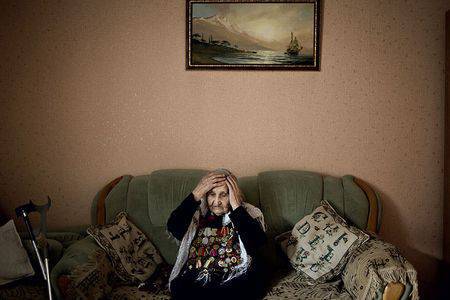
Photo: Andrey Lyubimov
Age 90 years
Nationality Crimean Tatar
Rank during the war lance corporal
Awards Order of the Patriotic War, I degree, medals "For Courage", "For the Defense of Sevastopol", "For Victory over Germany" and others
Born in 1924, in the village of Duvanka near Sevastopol. Then my mother moved to the village of Kamyshly, and we lived there. In school, they studied in Tatar. In 1933, we had a famine. Then many children died and the schools closed.
I went to study at the agronomist in the technical school and in the collective farm school. Then he was still on a six-month medical course. The technical school was in the village Tsuryuktau under the Old Crimea. There lived the Germans, who arrived in the Crimea under Catherine. I learned to speak German.
In the regiment
I was sixteen years old when I joined the army. In 1941, we had a third morpolk next to the village. I began to run to the regimental commissary and ask: “Comrade, you will enlist me, please. I am a Komsomol member, I must fight with you. ” They brought me home. And when the first bombs began to fall on Sevastopol, I began to help the regiment's military doctor. The doctor took my passport and I, sixteen, enrolled in the regiment.
Everyone in the regiment loved and respected me. The soldiers approached me, surrounded and listened, as I am talking ridiculously, with an accent. I did not know Ukrainian well, and Russian was easy for me.
In October, when the 25-I Chapaev Infantry Division retreated to Sevastopol, the Morpolk moved into it. I was enrolled in the 756 Mortar Division. 29 June 41-th in Sukharnoy beam, I knocked out a tank.
Nurse
I was a medical orderly. We took the wounded from the front to the medical unit. The light wounded were left with us, and the heavy ones were sent to the medical battalion in the Inkerman galleries. When I took the heavy wounded to the hospital, they asked me not to leave, they said: “Shurachka, hold my hands when the opera will be”. And I kept, and then quickly returned to the front.
I saw a lot of operations, I saw brains. One of our sappers, Kovalev, cut wire fences, and a German threw a grenade at him. His skull broke, and his bones hung on his scalp. Brains work, and a piece of skull hangs. I went to dress him, wet a white cloth with rivanol and put the skull in place. Then he put on his helmet, and I ran to the engineer sapper. We broke branches and made a stretcher, and they put a soldier on them. And they dragged him. Some wounded guts fell out. You take them and put them in the hole and tie them in with bandages.
The first time I was shy of wounded soldiers - I was young. Because someone will tear off his ass, someone's leg. Need to undress them. The man has all the organs visible. I was a girl, I was sixteen years old. The head doctor came and taught me: "You should not be shy, you should do the dressings."
Retreat
In 1942, we retreated from Kamyshly. Sevastopol was bombed by five hundred aircraft. They threw barrels and rails on the city. And when the rail flies, from it such a sound that it seems as if the sky will now explode. From this sound there was a terrible panic.
We were ordered to evacuate from Kamyshovaya Bay. A ship approached, we loaded the wounded there, but a bomb hit the ship’s nose and he drowned.
From Kamyshovaya Bay, we switched to a coastal battery at Cape Chersonese. This was our last exit. Everyone retreated there: military, civilians - all who did not want to be captured. From there we could not sail - there were no ships. We reached the Chersonesus lighthouse and kept the defense. The Germans were afraid to attack, because we were sitting in the caves and were ready to meet them. There I also helped the wounded. There was no medicine, so we dusted the rags with salt water and applied them to the wounds. Salt water did not let the wound fester - like salt salt.
4 July we were captured. We sat in underground trenches for pilots below under the airfield on Fiolent. They said to me: “Shura, go out and see what is above”. I went up to the airfield and saw the Germans. They also saw me, began to call. I shouted several times that ours would come out, and we went all the way upstairs. The Germans ordered to lie face down on the ground, not allowed to sit. Then one person gave the Russian command to get up. Manstein, the German commander, arrived by car and delivered a speech.
Escape to the partisans
I was in captivity only a few days. These parasites forced us to dig holes and bury the dead. Then they drove us into the city. And when we reached the Chersonesus Bay to the old cemetery, the commanders told us to run away. The bay was guarded by Romanian soldiers. They only loved, but didn’t shoot very much. Women came to the bay, they were looking for their husbands among the prisoners. There were six of us in civilian uniform, our grandmother approached us and took us to her home. Romanians did not do anything. Her name was Anna Yakovlevna, and she kept us in her for two weeks. I fed. The men changed their clothes, and the Germans thought they were local workers. We stayed in the city, and then went to the Baidar valley to the partisans.
In the partisan detachment, I became an underground worker. I had a password, nine letters - "FLEE". I still can not decipher it. They said to me: go to such a village, there is such a stone, leave a password under the stone. I did it, and in a day or two I came back, took the paper from under the stone and carried it to my commander.
During the war, the Germans shot Komsomol and Soviet leaders in the villages. Twenty people were shot in Kamyshlakh. My uncle, the former chairman of the village council, was shot. My mother went to the forest with a cow and two children.
15 April 1944, the guerrilla headquarters was combined with the headquarters of the 4 of the Ukrainian Front in the village of Sokolinoye. Then I met the former commissioner of the 35 battery Ivanov. He recognized me when he came to headquarters, and called me back to the 756 th mortar division. With him, we liberated Sevastopol and stormed Sapun Mountain. We saw how the SS shot each other, so as not to surrender. The last was Feldwebel, he shot himself.
Without article
We liberated Sevastopol, then I worked as an instructor for a month in the Komsomol district committee in Balaclava. My colleagues very much wanted me not to get into relocation. They offered me to marry a Russian or a Georgian. But I said that I did not want to get married and that I should look for my mother. I didn't know where she was.
I went to Saratov. The train got on without a ticket. I thought that I had benefits, because the front-line soldier, and the police grabbed me in Kharkov. We looked at my things, and there was a commissioner's bag. In the bag - his party card, German phrasebook and maps of the Crimea. They thought I was a spy. I was put in the car and taken. I was delighted - I thought it was my privilege. I was taken to the border guards. Some general came and asked who I was, whether I was homeless and if I had no tattoos. And I did not know what it is. I think he could have shot me like a spy, it's the 44 year. The war was still going on.
The general tells me - you will be two years at work. I agreed to work, and they took me to the kitchen without an article. Then I was taken far, far away, into dense forests of the Urals. There were bunkers, underground kilometer tunnels with food, canned goods. We cleaned and checked products.
I lived with prisoners, but I did not have an article. The security officer asked - what is your article, why are you here? I said I did not know, caught. As a Tatar, I was punished, probably, for what all the Tatars were then accused of. In fact, I was in the camp, but without a trial and without an article. Then, probably, they, through the KGB, began to find out where I served. All found out and three months later returned back to the Crimea.
I went with a stage of heavy wounded to Tashkent, fell ill with typhoid on the way and almost died, even lay in a morgue. I ran away from the hospital and went to look for my mother - she was taken to Uzbekistan during the Tatars' relocation.
After the war
Mom through the KGB found in 1945 year in Uzbekistan, in Namangan region. There was a security officer Budnik. He cursed, but gave me a folder with the affairs of the Tatars. He said that I was looking for my mother there, gave 1500 rubles and told me not to show anyone. I learned that my mother lives in the Chust district. The KGB officer said that I had to go there for a ride and that if I had to ask for money, I would reply “Budnikov ordered not to take the money”. Mom found a grandmother and sister. And she stayed there in the hospital to work as a nurse.
In 47, I lived in the Tashkent district, working as a foreman and timekeeper in cotton growing. I was at the reception of the counterintelligence general, he was my fellow soldier from Sevastopol - many of them went to Tashkent to command the settlers. So he helped me, found me a job.
There I met my husband. He is Azerbaijani, he served in fixed-term military service in Uzbekistan. We lived with him for only five years. His parents came and took him home, I went with him, but could not live there. Her husband's relatives lived in Nagorno-Karabakh, then they still lived in dugouts - and this was already under Soviet rule. I saw it and told him: “Navruz, save yourself, your relatives here, and I will save our children”. And returned to Samarkand. I have three children. Five years ago, my daughter went to look for him - found and brought here. So after 45 years, I met my husband.
In 66, my fellow soldiers found me through the magazine “Rabotnitsa”, and I went to Sevastopol. Went to the meeting of veterans. At the beginning of the 70-x moved to the Crimea. For a long time they didn’t want to let me back; they were allowed by order of Podgorny, the chairman of the Presidium of the Supreme Soviet of the USSR.
Quddus Kanifovich Latipov
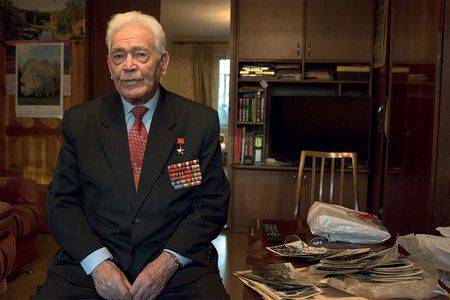
Photo: Yuri Kozyrev / Noor
Age 91 year
Nationality Bashkir
Rank during the war lieutenant (currently - Colonel aviation)
Awards include the Gold Star Medal, the Order of Lenin, (insignia for the title of Hero of the Soviet Union), three orders of the Red Banner, the Order of the Red Star, the Order of the Patriotic War, I Class, the Order of the Patriotic War, II Class and others
Since childhood I have dreamed of flying. He even attached wings to the sled and jumped from the roof. In March, 1941 went to the Sverdlovsk military aviation school of pilots, in seven months he completed an accelerated course. I felt the war. We already understood everything. From morning till night they were flying. We only flew for a hundred hours - but we had at least five hundred hours.
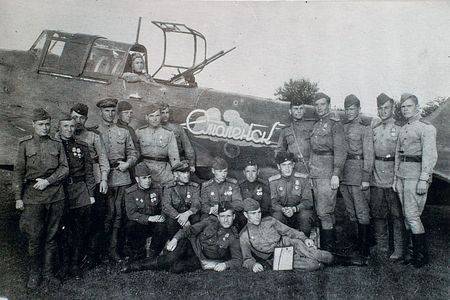
Photo: from the personal archive of K. Latypov
The outbreak of war
22 June 1941, we were gathered at a rally and announced that the war had begun. We were sure that we would quickly defeat the enemy. They sent someone to finish their education, someone as pilot instructors. Everyone wanted to front.
The front line ran from Lake Ilmen to Chudov along the Volkhov River. We flew at night - it is difficult for the enemy to find us in the starry sky, and you are guided by the stars. And against the background of clouds - like on the screen, they will see you at once and bring you down faster. I was given the first mission to find and bomb the artillery position about five kilometers from the front line. Well found. The sky is just starry. Found the target quickly, bombed. But as soon as they started to leave, they found us and started beating us. We went down, made an anti-aircraft maneuver and left. I did not have time to get scared even. We crossed the front line into our territory and calmed down. I later realized when I flew on attack aircraft, that this is the most dangerous moment - when you relax. The enemy was more experienced, they had already conquered the whole of Europe, they knew the psychology of the pilots. Just relax - immediately attack.
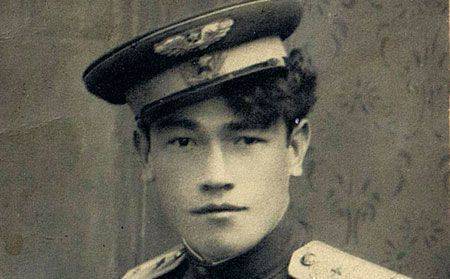
Photo: from the personal archive of K. Latypov
Weekday pilot
The average life expectancy of attack aircraft - eight sorties. An attack aircraft, even though it is armored, is difficult to survive on a direct hit, especially at low altitude. Therefore, they raised the height of the attack from 50 to 1000 meters, they made a second cab from behind, planted an air gunner and put a heavy machine gun on it. It became easier.
At the exit of the dive overload are good. It gets dark in the eyes, so you need to own weapons. Who owns masterly technique, he knows what angles of attack, angles of turns, turns, and so on. So that was cool enough, but at the same time not to lose the benchmark and consciousness. Sometimes a machine-gun turn goes, goes, goes for you - you need to save yourself, here you have already forgotten about the norms. And instead of giving a roll of 50 degrees, bent under 90 and pulled the handle harder: the overload, of course, is strong - you can lose speed and break. The more experienced the pilot, the more skillfully he owns the aircraft, the more chances to stay alive, the more chances to accurately hit targets.
Under the wing of the aircraft was a camera, which was fixed when you press the reset button, where the bombs fell. Machine guns and cannons too: shoot - take pictures. Did you get it? Did he destroy? How were fighters awarded? They took into account what kind of person: whether honest, patriot. Well, whether a skilled pilot. If in all respects normal, then for fifty combat sorties (plus the amount of equipment and weapons destroyed) was appropriated by the Hero of the Soviet Union. With an average life expectancy of eight combat missions. In the year 1945 raised the rate to eighty sorties. I was not shot down twice. In 1943-m shot down, and in 1945-m - almost. It would be a shame. Knowledge cannot be allowed.
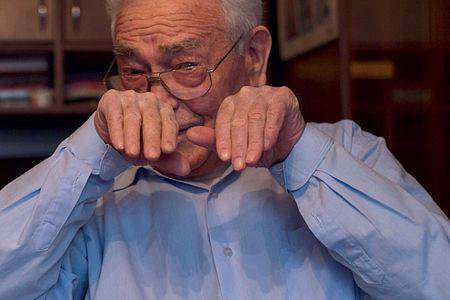
First feat
In 1943, our corps was transferred to the Western Front, to the Orel-Kursk Arc. Gave a task. Total 24 aircraft, I was the last closing link in - with the task and on the tanks to hit, and on anti-aircraft guns, and if attacked by fighters - to repel fighters.
At the beginning of the attack I saw gray squares - fascist tanks. They dropped bombs on them. The second attack was fired by cannons, machine guns. But it began! The enemy seemed to come to his senses, the fire of his anti-aircraft guns became fierce, and at the same time enemy fighters attacked us — Messerschmitt-109 and Focke-Wulf-190. Our group was attacked by eight aircraft.
At the exit of the third attack I hear a blow from behind. And then left and front. Motor stalled, screw stopped. I just have to transfer the plane to the planning. He looked around - ha, Germans, trenches. And my height is already three hundred meters, not more. In short, I did not have time to look back - this is already the earth! 50, 40, 30 meters, and at a height of seven meters must also be removed from the planning, you must have time to land. About seven meters, I - time! - I managed to remove the handle on myself - boo! And the plane is already on fire, from under the motor. I quickly jump, run about ten meters into the funnel. And then the plane exploded. I began to crawl away towards my troops. And the Germans are crawling behind me.
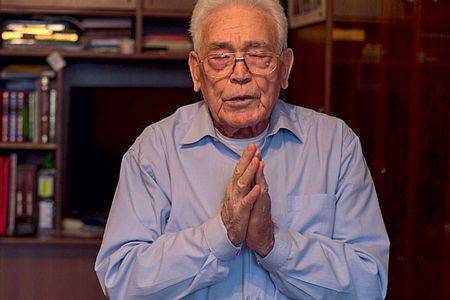
Ahead and on the sides shells and mines are torn. The pilots, just in case, were given two little leaves with them. He threw in a group of three or four people - like, stopped, hit. The second group is approaching - threw the second grenade. Decided they want to take me prisoner. They gave a lot for the pilot - a valuable prisoner, he knows a lot. The Germans are getting closer, and I have two or three rounds left. We had a rule - to devote the last cartridge to ourselves, such a law for pilots. Only I thought about it - a blow, sparks, lost consciousness.
After some time, he opened his eyes - his own man in a cap with a star looks at me. And the dog is joking: “Pilot, your task is to beat enemies in the air, and to destroy enemies on the ground is our business.” It was Lieutenant Popov from Nizhny Tagil, almost my countryman. The commander of the forward battalion saw everything: how we fought, how I fell, how the Germans chased me. And he sent a whole platoon to my rescue - led by Commander Popov.
This was the first such meeting with the enemy nose to nose and eyes to eyes. I began to choke him, he - me, their rescued. I met the German face to face only once. And did not even have time to understand anything - not to get scared, nothing. All the time there is a living movement of thoughts and body: you have to escape from the enemy, crawl, run. You do not even have time to realize what is happening. But the flow of the - green trees! It was a terrible thing, and you came out not only safe and sound, but also the winner. And over your fears, and over the enemy.
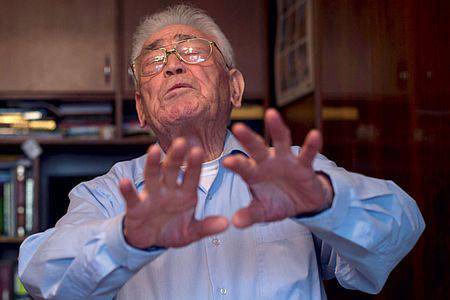
Second feat
Well, here we were weaker - to some extent it can be justified that I was shot down. But in 1945-m ... 17 April led a group of eight IL-2 to attack the ferry from the territory of Hungary to the territory of Slovakia. The crossing was near the town of Komarno on the left bank of the Danube. Find - otshturmovat. The first blow is very good, the second blow was also badly dealt. No antiaircraft guns - good. Turned around, we go again, already some kind of carelessness appeared. I leave the dive in complete peace and confidence that there are no anti-aircraft guns. And suddenly I look - a string of fireballs of small-caliber anti-aircraft shells. I did not have time to change the position of the aircraft. Rr-time! - direct hit in the right plane, exactly with the wing. And immediately the second - rr-time! - console beats off. The plane rolls over and falls down. Soon the earth is about to come. I can not manage - hard. Barely manage to withdraw from the roll and angle planning. But I feel it will be impossible to keep the plane in a normal position. What to do? Untied the belt of the tablet, tied them to the side of the control stick to a pipe or faucet. Thank God, the plane put in position. Hold on. And the group is following me. I immediately conveyed: "To me, everything is leaving." Slightly declined. On a low-level flight, we left the plane and the group.
The regiment commander says: “You were born a second time in a shirt. It should not be. You accomplished the feat, do you understand? Dead plane made alive. " According to the laws of aerodynamics, with such damage the plane had to fall: the console was damaged, the aileron joint, the wing was damaged. But planted. The regiment commander hugged: "Well done!"
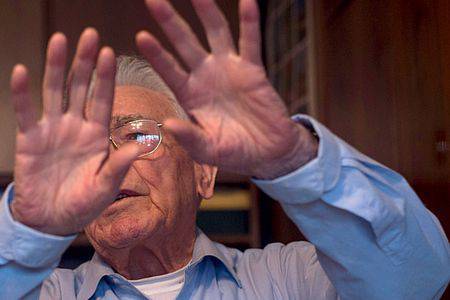
Last Flight
My last flight was 8 May. The enemy hastily retreats from Brno to Prague. I was given the task of leading my squadron. We felt that the day of victory was approaching: we had the chief of the chemical service of the regiment, knew German very well, and he listened to some radio station, not ours, and there we broadcast that an armistice would be signed soon. And here is my last departure. He struck a strong blow, absolutely no one shoots back. I dive - calmly, with pleasure. I shoot, hit, burn. Then - once! - the plane pecked. Pull the handle - does not go, the dog. Probably hit. Traction elevator does not work. What to do? Yeah, trimmer! Managed, left. When I left the dive, the screw had already begun to chop the tops of the trees. But I managed, went out and went. Another split second - and would have been there.
In 1943 I met the Germans on the ground, but I also met in the air. Look - unexpectedly, a plane attached to me. Christmas trees are green, it's German! Once - leave! And he smiles, his finger shows - in! Jokers. And met with the Romanian. I participated in the battles of the Yassy-Kishinev operation. There the Romanians fought together with the Germans. And now we are leaving quietly, suddenly - once! - fell in and looks at me, smiles. I started to snap, but he was gone.
I somehow talked to a prisoner, not a pilot, after the same operation. We sat on the airfield of Bacau, and there were brought prisoners, about five people. We surrounded them, watched them behave. More than half of the Germans understood that "Hitler Kaput." And one found an SS man: “No, we have new weapons, we will win. Heil Hitler! ”He was not afraid that he could be shot.
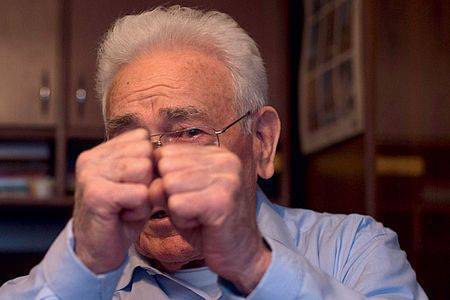
About nationalities
We had one case in the regiment: Abkhaz Kiazim Agrba repeated Gastello's feat on a bomber. Could take away, and he: "Death to enemies, long live the Soviet Motherland!" - And crashed into the location of the enemy technology. This can only be our man.
We were friends with him, he was the regiment's favorite. He could leave and not go to the ram. There was little chance of escape, but he could try to leave. But did not. The man was proud, proud - and in these conditions he decided to do this.
Why did the Soviet people fight so bravely, not sparing themselves? What is the essence of patriotism? Russian character, Russian soul plus communist-socialist ideology. The synthesis of these factors created a civilization that brought up unprecedented patriotism: loyalty to the Motherland, love for justice, for the highest, for all of humanity, love for the neighbor. This man is invincible, he did not feel sorry for himself. If such a synthesis happens again, Russia will be invincible. But if not, Russia will be crushed.
Bashkirs fully inherent in the Russian mentality. They are liking, in character - the same as the Russians. Bashkirs together with Russians from the time of Ivan the Terrible. Formally, most of the Bashkirs are Muslims, but essentially they have been basurmane for centuries: they believed in the power of nature, in the force of law, in the power of science. So am I. My village was seven kilometers from the Russian village. The father was always friends with the Russians: they were born together, grew up. There was nothing to share.
It is necessary now that the Russians do not allow nationalism. I meet with this at every step in Moscow. This is how they look at migrants - they get in the way, they are all flooded. So to me - "one of the Uzbeks." It hurts me. I do not like it when wonderful people become disgusting. This is chauvinism, this is hatred.
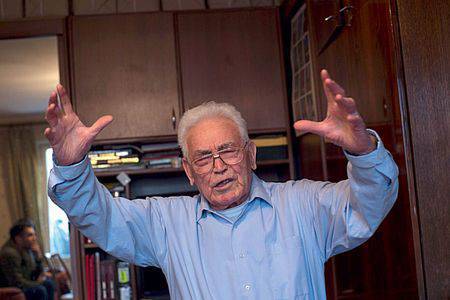
About faith
We had one pilot, Tambov, Boria Koshelev, who was secretly baptized. One comrade in the forest saw us and told us that Borya was praying on his knees behind the bushes. We quietly headed towards him, but he was already walking, with a guilty face. In short, only one person was with us in the whole regiment, who believed. But still he was shot down, no matter how he asked there. And the rest - no one believed, no one thought. There were, however, superstitious. Misha, for example, Khramushin. There were eleven girls in our regiment. If Misha had to go to the plane where the girl was standing, he shouted: “Go away, Tanya, from there!” As the sailors were afraid of women, so was he. Another hare pilot was afraid - like other black cats. He will see that the hare has run across the road, and immediately: “Okay, today I will not fly”. And he - if he put on a new uniform, this day he will not fly on a combat mission. But the ardent atheist bullets were afraid. 99% of the personnel did not think, did not guess, did not believe. And all of them to this day have remained atheists.
The hero of the Soviet Union was given to me after the war, in 1946. We looked at everything: what a person is, what human qualities, what a pilot he is. Considered the number of destroyed equipment. If you all have the same qualities, then you are a hero. I got 134 combat sorties, and assigned after eighty-one hundred sorties. I destroyed the 22 tank, five airplanes at the airfields, five artillery batteries, 450 soldiers and officers, two train trains with equipment and weapons, about fifty cars.
In 1948, he entered the Lenin Military-Political Academy. Then he served in the south, near Moscow, in Georgia, near Kursk, in Ukraine. In the end, he served in Moscow, taught at the Academy of Zhukovsky, and since then all the time here.
Kirill Konstantinovich Berends
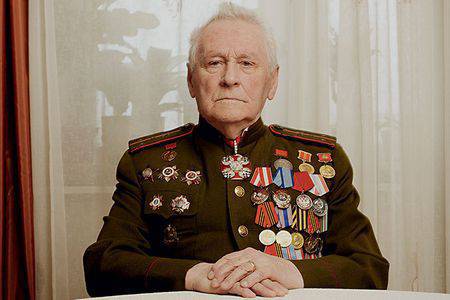
Photo: Alexey Kuzmichyov
92 age
Nationality Russian
Rank during war lieutenant
Awards are the Order of the Red Banner, the Order of the Red Star, two orders of the Patriotic War, the Order of Alexander Nevsky, the medal "For Courage", "For the Capture of Prague" and others
Son of a military man
I am Russian, but I have a German last name. The story is like that. Peter I began to recruit soldiers in Prussia to help make the army in Russia, and my distant relatives were brought here, provided with housing and worked on the reform of the Russian armed forces. These are my great-great-great-great. Ancestors deserved the title of nobility for their successful work. Our origin is German, but by adopting a nobility, we became Russians.
The first question was at school: who is your father? I wrote "soldier." Who is your mom? "Housewife". And it has been all my life: social origin - the son of a soldier. They asked me about the surname everywhere. And the parents taught us: “You say that you are Russian, that your grandfather, great-grandfather were Russian, participated in wars”.
Parents did not advertise their noble origin - this word was already forgotten. This was not said, it was negative. Both mom and dad were nobles, but they didn’t talk about it. I learned about it after the war.
Komsomol set
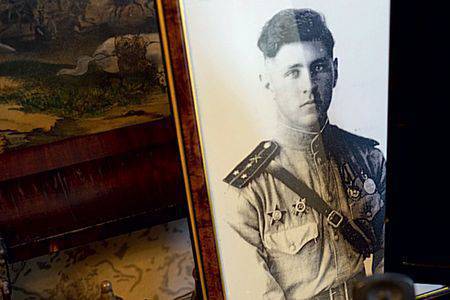
Photo: Alexey Kuzmichyov
How did the war come? In the morning I woke up, had breakfast, sat down at my table. Chiselled analysis and higher geometry - exams were coming. Nearby was a receiver on a red dresser. The military marches sounded on the radio, and this caused alarm. Because there was already a rumor: something happened. And then the war rolled on so that people forgot about their personal life, their fate, and obeyed only one thing: “this is necessary for war”. Immediately all the adult population went to the front and did not return.
I got into the army through the Komsomol set in May 1942. They called to the committee of the Komsomol Institute: who will go, who wants? We went to the dean, wrote a statement. The dean scolded us: “You don't understand anything! You were trained by an aviation institute. You need. You have factories! ”And we:“ No, we want to win the war ”. In January, 1943, we were sent to the Central Front.
We were trained, but when I arrived at the front, I immediately felt what I was missing: the ability to fight. To be able to fight is not only to be able to shoot. It is not only to see a German, this is also a German to catch, catch successfully and cunningly. And we fought the whole war by force. And I wrote to the school that I lack knowledge of tactics. They told me: “What a fool you are, but what if your letter came to its intended purpose? Someone felt sorry for you, probably, and broke this letter. ”
Kursk arc - it was a school. After the battle, I felt that I had finished another school, a front-line one, and became a commander. I sowed in the mind the ability to control myself in any situation and learned the word "must." Medal "For Courage" - my first combat award.
We ate all the horses that were our vehicle. The snow is gone and we ate the roots. Cooked the skins from the tree, drank birch sap. All the grass that went, we immediately ate. Horrible was hunger. And the epidemic was because lice started. No dugouts, nothing: in the snow lay sick with typhoid. I took off my clothes, shook over the fire and heard the lice burst.
Crossing
And then it was the forcing of the Dnieper. Our division was shipped across the Dnieper on its own, without support and cover. Everything was cooked quietly. The crossing was carried out with the help of improvised means. There were no pontoons, no boats, no rafts - and if they were, they were intended for ammunition and communications equipment. No guns, no mortars.
The crossing was scheduled for October 16 at night. The weather was very clear and from west to east, right in our face, the full moon was shining. On the surface of the Dnieper it was perfectly visible the lunar path and everything that could float on it. It was a starry sky and it was quiet. We had been preparing a few days before: we had to dig in the ground, so that people would rush into the water from the trenches not from an open area.
The transporting medium was a chock of a dry log tied with wire and tied to a belt. This tool saved from mines and fragments. With my left hand I was holding onto the wire near the very log, the right row, and behind my shoulders was a duffel bag and a rocket launcher wrapped in a film: rockets, ammunition. And nothing more. In boots and in one tunic. We floated quietly. Fog descended on the Dnieper, and the coast could be seen only by raising its head high. I do not remember how long I swam - probably it was a watch. I don’t know how many of us were. In the middle of the river the Germans discovered us, and the water in the Dnieper boiled. I remember some blinding bursts of shells — now to the right, then to the left, then in the front.
His legs soon became numb, his hand clenched into a fist. Already on the other side looked back - all the islands were littered with corpses, the bodies of the wounded. I buried my knees, felt the ground, put my hands in front of me and my head on them. I lay and could not get up. The battalion commander said: “Lieutenant, get up, now we will storm the Germans. I need a battery fire. ” This word is “necessary.” I wake up.
When it dawned, they went to the counter. We had no weapons — everything was wet. We just choked people. I do not remember what I did yet. Maybe the mouths burst. I was a terrible beast. The Germans fled, we fled after us, we were shot, the planes flew over us - both ours and Germans. Dropped bombs, bombed. German tanks crawled. There was sand, puddles of water to the waist, we were splashing in this slush and got to the firing position of the Germans. For the battle on the Dnieper, I received the Order of the Red Banner.
Love Gunners
Then, already in Germany, the war was completely different. We came to the German city of Cottbus, which the Americans and the British bombed, turned into ruins. The city was not from houses, but from destroyed stone pyramids. All people died. My hair then stood on end, terrible.
I returned to Moscow at the end of October. Institute graduated in 1950 year, became a radio engineer. After graduation, he worked in the design office at the Almaz Scientific and Production Association.
With my future wife, I studied at school from the first to the tenth grade. She was an artist, we produced wall newspapers. Before the war, we managed to go to college: I went to MAI, she went to Architectural. Both had finished the first course, they were excellent students, they went to the army. Both served in artillery troops. Both survived and returned alive. Met, continued friendship. In 1946, we got married, lived together for 69 years. We had a son, we had grandchildren. 19 January of this year, I spent her last journey.
Mark M. Rafalov
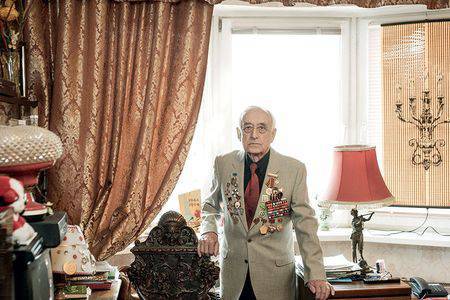
Photo: Konstantin Salomatin
Age 90 years
Jewish nationality by father
Rank during the war guard captain of the Marine Corps
Awards Order of the Patriotic War of I degree, Order of the Patriotic War of II degree, Order of the Red Star, Medal "For Military Merit" and the medal "For the Defense of Moscow" and others
Born in 1924 in Kharkov. Father - one hundred percent Jew, mother - Russian noblewoman. Here is such a cross between me. When I was two years old, we left for Paris - my father was a trade representative there for five years. And since 1930, the family lived in Moscow.
Son of the enemy of the people
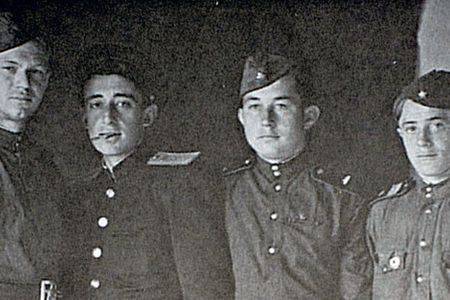
Photo: from M. Rafalov’s personal archive
26 June 1938-th father went to work, two men approached him in uniform, put him in a car and took him to the Lubyanka. He was beaten there. In August, he passed a note to his mother: “Faith, do not send me hard food, I have no teeth anymore.” They needed to achieve recognition that his father was a Trotskyite. He signed this protocol after forty days, but did not pledge his comrades: he only gave the names of those who were shot or had already received a term. Then in the registry office I was given a death certificate, where it is written that he died of heart disease.
Recently, somewhere it was reported that about 52% of Russians today, in 2015, encourage Stalin and Stalin’s policies. I and my fellow soldiers tried not to touch on the topic of Stalin, because they immediately said: "They just didn’t imprison them like that." My mother and I were told that we were lucky because we were given eight years with the right of correspondence - in fact, the father did not die in Moscow, but already under Magadan in the camps, March 7, 1944.
They built such a regime - from there people never returned. For a quote from Trotsky. There is a panicked letter from 1942’s father of the year that he doesn’t remember anything, he forgot all the addresses — he writes to our neighbors. And we had a four-room apartment in the very center of Moscow, between Petrovka and Stoleshnikov. So, about a week later a boy in uniform appeared and showed his mother the order to clean the apartment in 24 hours. She looked after the general of the NKVD.
Instead, they wanted to give the room - 13 meters. Mom still had some connections, she called and we were put in a communal apartment: a huge room, 25 meters. We later learned that the Enkavadis planted their major in order to instill us there.
Today they talk with a grin about the feeling of patriotism, and we were very patriotic. Then I treated Stalin with respect - then I became enlightened. And then - well, no father and no. By the way, in this house where we lived, on the Petrovsky Lane, Vneshtorg has built the fourth and fifth floors. We went out to play football and said to each other: "Here already the light does not burn, and there does not burn, and there does not burn." Both floors were empty for several months 1937 – 1938. Even this did not change my attitude. And only then, during the war, I saw a lot.
Mom was not taken anywhere because she was “the wife of the enemy of the people.” “There is no question of working,” as they say in Odessa. I was then thirteen years old, and my sister Yulia was eight. In front of the Central Department Store, there was a snack bar, and my mother agreed that she would print a menu on tissue paper every day, and for that (she couldn’t be accepted by the staff, she would be punished) would be given some kind of naval soup, steam cakes, compote. This saved our lives, because in 1941, the card system was introduced, and we were not given cards.
When the expulsions began, the house management did not enter my mother in the lists of unreliable, and we were not touched, and my mother was ready to go - the other wives were in camps in Central Asia. And then, sorry for such a turn, fortunately our family started the war, and mother became the mother of a front-line son: she was hired to work at school.
The defense of Moscow
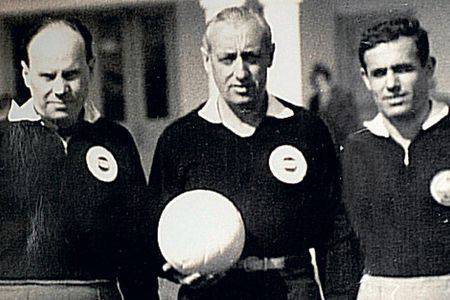
Photo: from M. Rafalov’s personal archive
How did I know that the war started? Such cardboard plates hung on the walls; loudspeakers — I was at home with my mom on June 22. In a short message, Molotov said that the Germans had committed a treacherous attack, and so on. But in fact, not treacherous - Stalin knew everything, received messages from intelligence officers.
But we understood before. The windows of our kitchen in a communal apartment overlooked the courtyard, and we saw something digging in the yard, reinforcing it - bomb shelter. And just before the war, about ten days before the start, there was a message from TASS that we had good relations with Germany and a non-aggression treaty. Exactly a month later we were bombed. We, the boys, were assembled and announced that they were creating Komsomol youth groups to combat the consequences of enemy air raids. They gave out night passes and said every time where to go.
One evening, a package of lighter bombs fell on the roof, and we sat in the corners. I then played football and did not smoke - I despised this business, and then, with a fright, I began to smoke. Neutralized three or four bombs: there were barrels of water, boxes of sand, mittens were ticks, and I had to throw bombs on the street, drown or bury in the sand. A few years later I received my first military award - the medal "For the Defense of Moscow". That is, we have already been considered participants in the war. And after a while another German plane began to fly and throw bombs at Moscow. I ran up to the window and saw: between the Bolshoi Theater and the Small there was a girl of about five years old, covered in blood, and my mother was bending over her and bending over her. Then this plane on Tverskaya Street hit the line that stood in the grocery store. Beat a lot of people. These are the first days when I felt the war alive.
October 16 1941 of the year was a panic, the Germans were standing not far from Moscow, and all institutions were instructed to burn the archives - ashes flew from all the windows. Mom made a kind of feat: she thought that people would come from the evacuation and not find their documents, she wrapped the papers in labor and diplomas and brought them home. At the end of the war, mother returned their documents to the people - they were so happy!
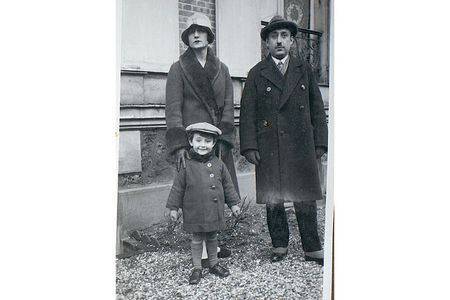
Photo: from M. Rafalov’s personal archive
Appeal
Called me in the fall of 1942 of the year. They called me, although I was the son of an enemy of the people, because there was already someone. Three and a half million were already in captivity. The Germans are near Moscow, and we haven’t done anything - the tanks were no match for hell, for the T34, the EC-2, the EC-3 - all this appeared already in 1943 – 1944.
I then played football for the Moscow club Krylya Sovetov, it was then class A, the current Premier League. We were taken to the Mari ASSR - a cold camp for thirty thousand people, where junior commanders were trained. I was assigned to a mortar school, and on New Year's Eve 1942 – 1943-th we were already in the North-Western Front - Velikoluksky region, now Pskov. 27 February 1944-I was already a platoon commander, and with a platoon we were among the first to enter the flaming city of Pustoshka. After that, I was wounded for the first time - in the leg, May 17.
Yes, we were not given any mortars, they simply did not have enough, and we got into the marines - we picked up sports guys, and I ran great. I could easily perform the second discharge, even after girls and after drunkenness. So I generally was a spanish guy. Lived fun: girls, wine, canned food.
I had a quatrain:
We broke enemies
But there was one in our midst.
We did not share the glory,
He took all of her.
Pustoshka had to be liberated, because it stood at the crossroads of Leningrad — Kiev and Riga — Moscow, and there the highway and the railway — the Germans received food and weapons. There are very swampy places. The battles were very hard, twenty-two thousand of our children were laid. And next to it on a very high mountain was the small village of Gorushka, there was a battery of light German guns, and they shot our units from this mountain. An order was received from the big authorities to take this Gorushka. And there was a lot of snow, and we decided to carry out an attack under the cover of the smoke curtains, and we brought checkers. They set fire to the early morning, they caught fire, and almost immediately the red rocket was an attack. We have risen. And the horror: the smoke did not go in the direction of the Germans - but according to the wind rose it should have been so, but along the trench - the god ordered it in his own way. That is, we did not hide anything.
Thirty-three people in my eyes were killed. The Germans had heavy machine guns, and they shot our guys. Gorushka, of course, did not take. The next day, Major SMERSH calls me up and says: “So what did you get tired of there? Tell me. I say: "Nadymil, as it should be." “Why did the smoke go through the trench?” Well, I was a joker: “This is the question there,” and I point the finger to the sky. The major replied: “Bastard! I nabyu you face! Get out of here! ”You see, he probably knew that I was the son of an enemy of the people. My platoon was one of the first to enter Pustoshka, and they presented me for a reward — the Order of the Red Star, it seemed, they wanted to reward. Two others besides me were presented, they gave it to everyone, and my prize list returned. SMERSH wrote: “Who are you rewarding?” That person should have endorsed. And he did not endorse.
12 April 1944-I was wounded in the throat: "blind shrapnel wound to the neck with laryngeal injuries." Somewhere very close to Pskov the Great River flows, in battles there they created a springboard. We had self-propelled guns, and there were not enough intelligence officers to determine the location of the German guns on that side of the river. The six of us spent the whole night in the snow and marked the location on paper. Ours provoked shots, the Germans immediately responded, and it was obvious where the guns were, where the machine guns were. And there is a distance of two hundred meters. I have a poem:
Two hundred meters total
There are enemies settled down.
Two hundred meters total
But go, run.
Morning. I go first, on the side of the gun. But the Germans let the company of Minka go - I caught seven fragments, but did not touch the guys. Here on the throat and here on the face. So did not get the pieces, but I'm used to it already. Shaving only uncomfortable. This year they sent me to the tomography, and there they ask if there are foreign bodies. They wrote: "It is not necessary to remove all foreign bodies." Well, where - clean? I'm already 91-th year is coming.
Here children at school often ask if I was scared. Of course, I was afraid - everyone was afraid, but fear must be able to overcome, you're a man. I had one guy in the platoon, so he fell to the ground during the shelling, hiding.
After the war
I was a senior sergeant, a platoon commander — that is, an officer. And when I was wounded, I was taken by plane to Seliger, to the city of Ostashkov. He lay in the officer's chamber: an additional ration was given, and not a shag, but a Kazbek. And I really wanted to return to my unit. I was assigned to the reserve regiment. People from hospitals are returning there, recruits. At that time there was a decree that children who have nine classes or more have to be educated should try to keep: there must be someone to work. They come to recruit children in military schools, but I immediately refused from the infantry. And then the colonel arrived, such a mischievous man, we talked about football with him, then we went to Chelyabinsk, and they took me to the Chelyabinsk tank-technical school. I graduated with honors.
He served on the Trans-Baikal-Amur Front for almost two years. In 1947, I already played football for the team “District House of Officers”, and then I became “Tankist”, they played in class “B”. He played for the national team of the army.
And then I tried to demobilize - you need to write a report. But you can't get over the heads of the authorities, but the regiment commander Popov could not stand me, because I was playing football. We still had Mashkov, so he was a tenor - he flew away all the time to concerts. And I went to the training camp, then to the game. And he didn’t like both of us, he said at the party meetings: “Rafalov and Mashkov don’t want to serve - they are tearing one’s throat, the other is chasing the other bubble”. In the end, the battalion commander suggested: “Why are you writing Popov, he will never let you go! For whom did you vote in the Supreme Council? ”He replied that he was for Marshal Malinovsky. He replies: “There is no marshal. Write to the deputy of the Supreme Council of Malinovsky Rodion Yakovlevich. Write as a deputy. ” I wrote that I had such a wound that I wanted to learn. And I did not deceive him, then I finished the institute in Moscow.
After the XX Congress, the father’s party was rehabilitated. My sister and I, according to the law, have become completely valuable people, but still some people look askance. Especially fellow soldiers. When the conversation about the father comes, they say: “They just didn’t plant just! So something was. ” At the same time all the good, beautiful people. This is all the merit of propaganda - so driven into the head. For an attitude to change, time must pass.
My attitude also changed gradually. At the front, we once got into conversation with one guy from the penal battalion: he graduated from a railway institute, a Muscovite, worked as a dispatcher on the railway. So he somehow did not sleep for a day, and it turned out that he gave the wrong command: sent the freight car to another car full of sugar. People came running, pulled away this sugar. He was thrown twelve years in the camps, but replaced by the front. We met with him when he was wounded already, and if the wound was immediately amnesty. These little episodes all changed little by little. Then there was Major Devyatayev, he is from Gorky. He was the commander of the attack aircraft, he was shot down and captured, he got into the camp and fled with the guys on a German plane. Arrived, and he was given nine years in prison. After the speech, Khrushchev was just released. Here is his fate sunk into the soul. Yes, a lot of guys from different stories I know, it all accumulated. Books then read a lot. With the "Memorial" is connected.
About nationalities
There was almost no nationalism in the war. In my platoon were Vasya Belov and Utkin, both Karelians. Even Budorzhapov and Budorkhanov are Kazakhs, with whom I went on reconnaissance. Both are healthy. Zemlyaninik was a Jew. Smorodinov - Russian. Such a mixture. Nobody paid any attention to this.
I did not feel any oppression on the national front, but I will tell you a small episode. In 1943, the Red Army books and officers' books were changed. We sat with the clerk in the dugout of the battalion headquarters, and he said to me: “Mark, it’s written in your Red Army book that you are a Jew. What should I write? ”I say:“ I don't know. ” My mother is Russian, but then preference was given to father. Now, as far as I know, among the Jews they count on mom. I say: "I guess we should leave it that way." Then the captain opens the door and says: “All Jews are in Tashkent. There are no Jews here. Write: Russian. " And when I was demobilized in 1947, I had to change the documents, hand over my documents, and in them Russian.
By the way, in 1940, when I was sixteen years old, I went to the police to give documents, and my mother, because she was a very intelligent woman, said so calmly: “Son, if they ask about the fifth paragraph, say better that Russian”. She was a noblewoman, experienced already - in the Civil War, in Kharkov, several times passed from hand to hand. She knew that Jews are not very fond of. Passport me through a glass piece says: and here what are we going to write? And I already forgot about my mother and I answer: "Father is a Jew." She's head to the side. “And mother is a Russian noblewoman.” She already jumped: "So this is even worse!"
And in the 1947 year - then bad moods appeared - I was called to the party committee. Someone there reports: this is a disgrace - was a Jew, and now Russian. It is necessary to exclude, they say, from the party. But there were guys, they said: “He returned from the front, twice wounded. Marine. What do you want from him? Write a reprimand without entering your registration card. ”
During the heyday of anti-Semitism in Russia, I was fired in 1952 from the Ministry of Heavy Machinery. I worked in the central office of Mintyazhmash, but I was fired. Then I went from morning to evening, I was looking for a job — I didn’t take anything, even a student’s student. Saved me the case. At the Pokrovsky gates I met a friend, Nikitin, then he was the head of the physical training department of the Peat Institute. He said that veterans could get the right to become students. I began to hammer and out of five exams I received three fives and two fours - I entered. Then I was elected chairman of the sports club, the union began to pay good money. Propaganda was such that pronounced Jews were afraid to go outside. Fortunately, that period did not last very long.
After graduation, he became an engineer, went to work at the All-Union Scientific Research Institute of Lifting and Transport Engineering. He worked there all his life. After being wounded in the leg it was hard to run, and I moved into the category of judges. I wanted to play football, I came to the College of Judges and stayed.
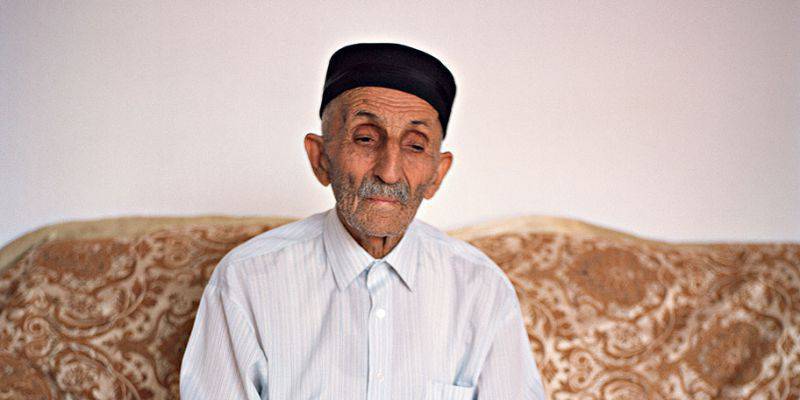
Information